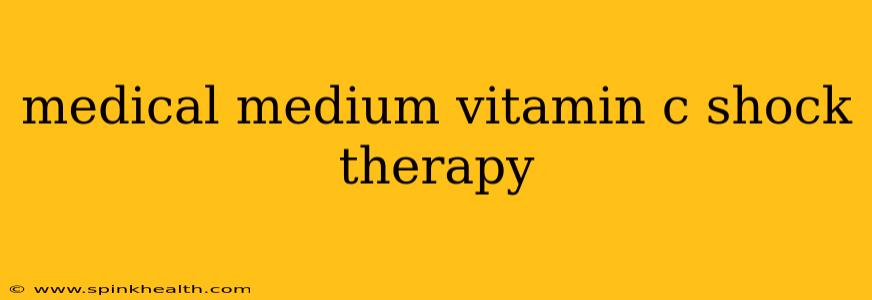Medical Medium Vitamin C Shock Therapy: A Deep Dive into Anthony William's Controversial Protocol
Anthony William, the self-proclaimed "Medical Medium," has popularized a controversial approach to health and wellness involving high-dose vitamin C. His method, often referred to as "vitamin C shock therapy," involves consuming significant amounts of vitamin C to purportedly flush out toxins and address various health conditions. While this approach has gained a considerable following, it’s crucial to understand both its potential benefits and significant risks, particularly the lack of scientific backing. This exploration will delve into the claims, the controversies, and the potential dangers associated with this practice.
What is Medical Medium Vitamin C Shock Therapy?
At the heart of William's approach lies the belief that high doses of vitamin C can overcome specific viral, bacterial, and fungal infections that conventional medicine may miss. He often suggests consuming massive amounts of vitamin C, sometimes in the form of intravenous infusions or through incredibly high oral doses, to trigger a sort of "cleansing crisis." He claims this crisis, characterized by various symptoms such as fatigue, nausea, or headaches, represents the body eliminating pathogens and toxins.
Does Vitamin C Shock Therapy Actually Work? The Scientific Perspective
The scientific community overwhelmingly rejects the claims behind "vitamin C shock therapy." While vitamin C is essential for numerous bodily functions and acts as a potent antioxidant, there's no credible scientific evidence to support William's extraordinary claims regarding its ability to cure or treat a wide array of diseases. The purported "cleansing crisis" isn't backed by research and is more likely explained by the potential side effects of megadoses of vitamin C.
How Much Vitamin C is Too Much? Understanding Toxicity
What are the potential risks and side effects of high-dose vitamin C?
Consuming excessive amounts of vitamin C can lead to several unpleasant side effects, ranging from mild to severe. These include:
- Gastrointestinal distress: Diarrhea, nausea, vomiting, and abdominal cramps are common complaints.
- Kidney stones: High doses can increase the risk of developing kidney stones, particularly in individuals prone to them.
- Interference with medications: Vitamin C can interact negatively with certain medications, potentially reducing their effectiveness or causing adverse reactions. This interaction requires consultation with a physician.
- Other potential risks: Some studies suggest that very high doses of vitamin C might increase the risk of iron overload in individuals with hemochromatosis.
It’s crucial to remember that the body has a limited capacity to absorb vitamin C. Excess amounts are simply excreted in the urine. The idea of a “therapeutic crisis” is not scientifically supported; what’s more likely happening is a collection of adverse reactions due to megadosing.
What are the alternatives to Medical Medium Vitamin C shock therapy?
Conventional medicine offers a range of treatments for various illnesses. These treatments are backed by rigorous scientific research and clinical trials, and they often involve a holistic approach considering the individual's overall health. Always consult a qualified medical professional for diagnosis and treatment of any health concerns. They can provide accurate information and create a personalized treatment plan based on your specific needs and medical history.
Can vitamin C be harmful? What should I do if I experience adverse reactions?
Yes, excessive vitamin C intake can be harmful. If you experience any adverse reactions, such as severe gastrointestinal distress, kidney stones, or any other concerning symptoms after consuming high doses of vitamin C, seek immediate medical attention. Do not attempt self-treatment.
Is intravenous vitamin C therapy safe?
Intravenous vitamin C therapy (IVC), while not directly linked to the Medical Medium’s claims, also requires caution. While some preliminary studies have shown potential benefits in specific contexts, the long-term effects and safety of high-dose IVC are not fully understood, and it carries risks such as infection at the injection site. Any use of IVC should be under the strict supervision of a healthcare professional.
Conclusion:
The "Medical Medium vitamin C shock therapy" is a controversial and largely unfounded approach to health. While vitamin C is a crucial nutrient, there's no scientific evidence to support the claims made by Anthony William. Always consult a licensed medical professional for health advice and treatment. Relying on unsubstantiated claims can be detrimental to your health. Prioritizing evidence-based medicine is crucial for your well-being.

